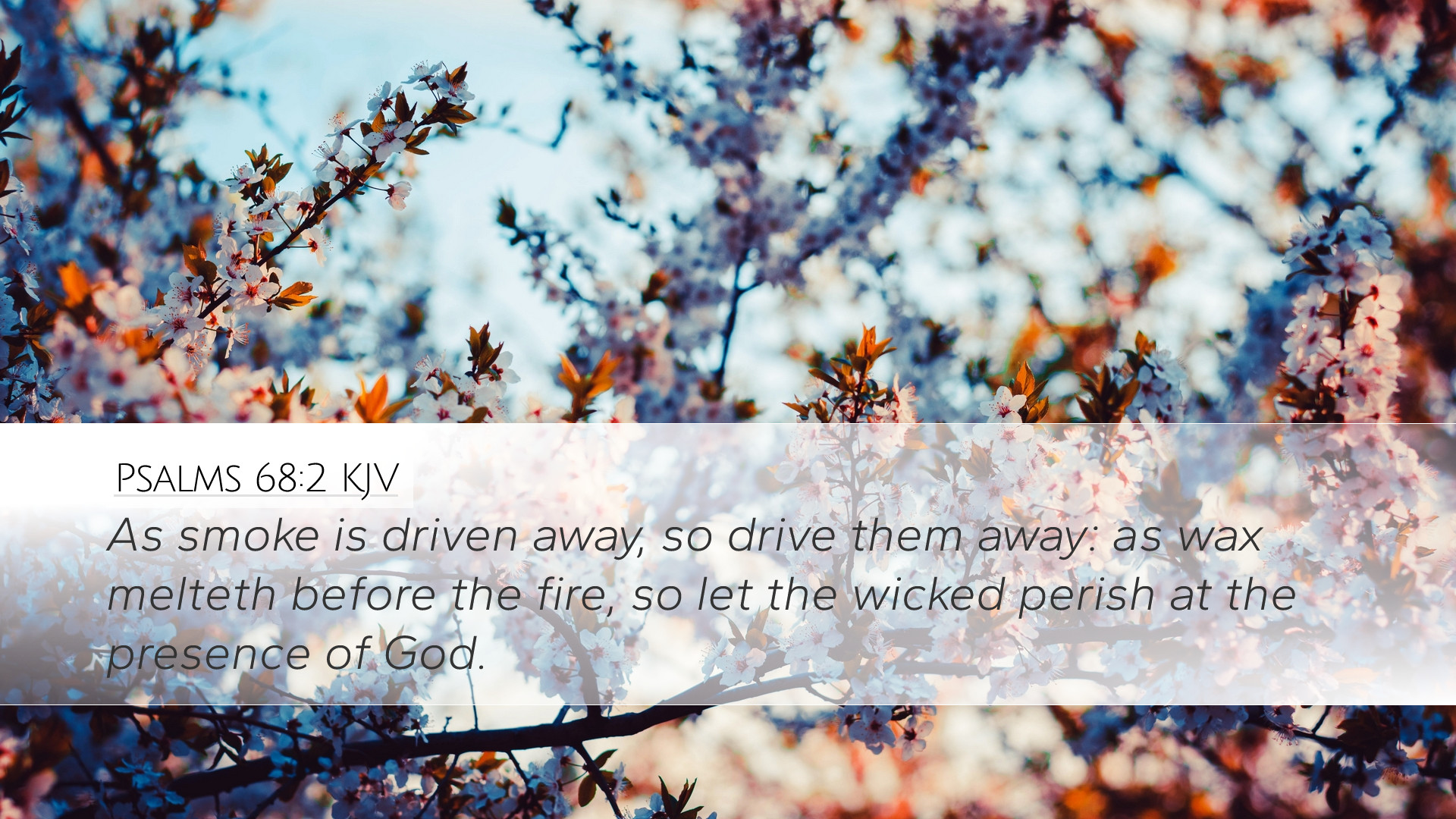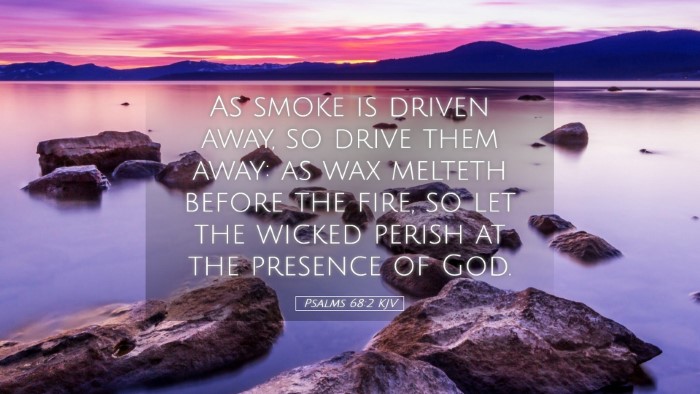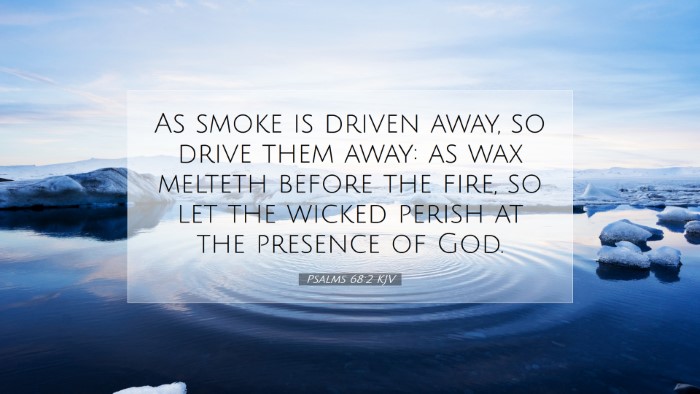Commentary on Psalm 68:2
Verse Context: Psalm 68:2 reads, "As smoke is driven away, so drive them away: as wax melteth before the fire, so let the wicked perish at the presence of God." This verse portrays a vivid picture of God’s power over His enemies, utilizing imagery of smoke and wax to illustrate the transient nature of evil in the presence of divine righteousness.
General Overview
This psalm is a song of triumph and victory, attributed to David, celebrating God's majesty and His favor toward His people. It combines themes of divinely inspired warfare, the gathering of the righteous, and the destruction of the wicked. The metaphorical language employed sets a tone of assurance and confidence in God’s sovereignty.
Commentary Insights
Matthew Henry's Commentary
Matthew Henry emphasizes the contrast between the fate of the wicked and the righteous. He interprets the imagery of smoke being driven away as a representation of how God will scatter His adversaries. The quick dispersal of smoke shows the ineffectuality of the wicked against divine authority. Henry notes the source of this imagery lies in the immediate effect of God’s presence, which repels evil much like smoke dissipates rapidly in the air.
Henry draws attention to the idea of wax melting before fire, which he views as another stark metaphor. Just as wax yields to heat, so shall the wicked surrender to God's judgment. This reinforces the concept that wickedness cannot endure in the light of God's glory and justice. He encourages believers to take comfort in knowing that while evil seems pervasive, it ultimately falters under God's watchful care.
Albert Barnes' Notes
Albert Barnes explicates that "driving away" suggests a forceful action that God takes against the ungodly, leading to their obliteration. Barnes points out that the psalmist calls upon God to act decisively, likening the fate of the wicked to that of smoke—temporary and insubstantial. He asserts, “The wicked will be dissipated, like a shadow, at the advent of God’s holiness.”
In addition to the theme of destruction, Barnes underscores the importance of God’s presence in this transformation. The psalmist’s prayer for God’s intervention speaks to the belief that God not only destroys evil but actively guides and protects the faithful. Thus, Barnes encourages believers to seek refuge in God's presence, where peace reigns and evil cannot coexist.
Adam Clarke's Commentary
Adam Clarke offers a poetic interpretation, suggesting that the images of smoke and melting wax signify the fleeting nature of human pride and rebellion against God. Clarke interprets "smoke being driven away" as a depiction of God sweeping away the oppressors of His people, allowing righteousness to prevail. He also emphasizes that the use of wax illustrates the inevitability of divine judgment—just as wax cannot withstand fire, so too will injustice face defeat.
Furthermore, Clarke highlights that the phrase “before the presence of God” underscores the transformative nature of God’s holiness. In His presence, evil cannot sustain itself, and thus the faithful are encouraged to remain steadfast in their pursuit of righteousness, knowing that God’s power will ultimately prevail. This commentary finds a call to action wherein the faithful are reminded of their role in upholding justice and peace.
Theological Reflections
The message that emerges from Psalm 68:2 is one of hope and assurance for believers. The graphic images of smoke and wax effectively convey the sovereign authority of God over evil. When attending to this passage, pastors and theologians are reminded that it asserts God’s desire to intervene in human affairs—scattering wickedness and asserting His righteousness.
As contemporary believers reflect on this, they should be encouraged that despite the evidence of evil in the world, God’s ultimate victory is assured. This psalm serves as both a warning to the wicked and an encouragement to the righteous, illustrating that while temporary troubles may arise, they do not thwart God’s plans. Faithfully walking with God brings assurance of His protection against adversities.
Practical Applications
- Affirmation of Faith: Believers are encouraged to affirm their faith in God’s ultimate power over evil, reinforcing the belief that their struggles are seen by a sovereign God.
- Encouraging Others: The imagery serves as a point of motivation for church leaders in encouraging their congregations that God will deliver them from oppression.
- Personal Reflection: Individuals should reflect on areas in their lives that require God’s intervention and ask Him to act against the “wickedness” present therein.
- Gathering in Worship: The psalm calls for communal worship, reminding believers of the importance of gathering to celebrate God’s goodness and seek His presence together.
Conclusion: Psalm 68:2 encapsulates the reality of God's justice and the promised fate of the wicked in the face of divine sovereignty. By utilizing rich metaphorical language, the psalmist delivers a profound message of hope and assures the faithful of God’s protective presence. As believers reflect on this passage, they are called towards a deeper trust in God’s plans, inspiring them to remain steadfast amid trials and to encourage one another in communal faith.


